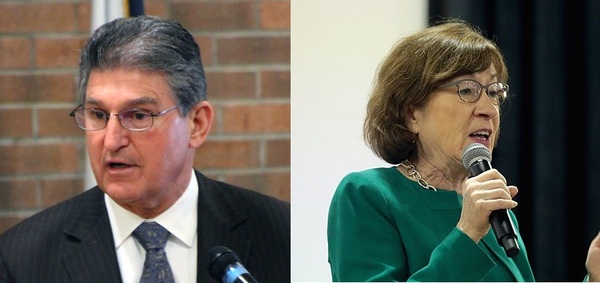
–>
June 27, 2022
No sooner had the Supreme Court issued its Dobbs opinion then West Virginia’s sometimes-rational-Democrat senator Joe Manchin and senior Maine-Squish-Republican, senator Susan Collins, came out expressing their combined horror and indignation over the decision. They both went to say they were aghast that both Brett Kavanaugh and Neil Gorsuch had apparently misrepresented to them, both in private meetings and during their hearings, that they would respect established precedent. The senators felt “betrayed” by the pair. Manchin was quoted as saying, “I trusted Justice Gorsuch and Justice Kavanaugh when they testified under oath that they also believed Roe v. Wade was settled legal precedent and I am alarmed they chose to reject the stability the ruling has provided for two generations of Americans.” Collins in her statement said, “This decision is inconsistent with what Justices Gorsuch and Kavanaugh said in their testimony and their meetings with me, where they both were insistent on the importance of supporting long-standing precedents that the country has relied upon.” What each of these senator’s statement reveals, without saying it out loud, was they thought they had a deal. What sort of deal? If you promise not to touch Roe, I will vote for your nomination. In short, the classic quid pro quo. By their comments it was obvious that both senators felt they had been “double-crossed” and they were none too happy about it.
‘); googletag.cmd.push(function () { googletag.display(‘div-gpt-ad-1609268089992-0’); }); }
Until Senator Ted Kennedy and his merry band of Democrats on the Judiciary Committee, which included the current occupant of the White House, decided, beginning with Robert Bork, then continuing with Clarence Thomas and most recently Brett Kavanaugh, that it was acceptable to try and totally destroy a nominee to prevent the confirmation, the hearings were a fairly humdrum affair. There would be focus on previous opinions, judicial philosophy, etc., but overall, the hearings were, by and large, rather mundane. Since Roe was issued, things changed. As the years after Roe wore on, it seemed Democrats and their leftist constituency became increasingly more concerned about the long-term viability of Roe, which they all knew was grounded on precarious, if not outright specious jurisprudence. The pro-abortion cabal could also see that American attitudes towards abortion were changing, thanks, in large part, to significant advances in neonatal medical science and technology made in the succeeding years. What Americans understood about developing babies when Roe was decided was nowhere near as much as the extensive knowledge gained in the decades following the decision, because of such things as ultrasounds. Further, thanks to other advances in medicine, the age of viability was lowering and there was now the ability to perform intra-uterine surgery to correct defects. If only to make matters worse, Republican after Republican won the presidency, and more conservative justices were being confirmed. As the number of left-leaning justices declined, and the balance on the Court began to shift, the more exercised the Left, their Democrat minions, and the increasingly corrupt media became about the possibility Roe might be severely curtailed or even outright overruled in the future. And so, a litmus test was needed for Republican nominees, except that senators could not directly ask a nominee to state in advance how they would decide a theoretical case involving abortion. In fact, none other than former left-wing icon, the late Justice Ruth “Notorious RBG” Bader  Ginsburg, set the standard by successfully dodging all such hypothetical questions at her confirmation hearing. As a result, Democrat senators and Republicans like Collins were reduced to asking nominees indirectly about their thoughts on such topics as long-standing precedents, etc., but which, in their mind, meant overruling Roe. So, in the end, Manchin and Collins thought they had their bargained-for-exchange with Brett Kavanaugh and Neil Gorsuch. When the two did not hold up their end of the perceived bargain, the senators clearly felt they had been “had” and so issued their respective petulant statements. It is, after all, easy to understand their ire, because never before in U.S. history had a Supreme Court nominee ever not ruled the way the president who nominated him wanted him to, or even the senators who confirmed them had hoped. Well, okay, almost never.
Ginsburg, set the standard by successfully dodging all such hypothetical questions at her confirmation hearing. As a result, Democrat senators and Republicans like Collins were reduced to asking nominees indirectly about their thoughts on such topics as long-standing precedents, etc., but which, in their mind, meant overruling Roe. So, in the end, Manchin and Collins thought they had their bargained-for-exchange with Brett Kavanaugh and Neil Gorsuch. When the two did not hold up their end of the perceived bargain, the senators clearly felt they had been “had” and so issued their respective petulant statements. It is, after all, easy to understand their ire, because never before in U.S. history had a Supreme Court nominee ever not ruled the way the president who nominated him wanted him to, or even the senators who confirmed them had hoped. Well, okay, almost never.
In last 75 years, there have been well-known examples of nominees (always appointed by Republicans, it seems) who unexpectedly veered off in the opposite direction from where it was predicted they would be philosophically. Among the more famous, or infamous, depending on one’s perspective, was Chief Justice Earl Warren. Nominated in 1954 by President Eisenhower, a Republican, for the position of Chief Justice, once confirmed, Warren went on to establish a legacy as one of the most left-leaning justices in history. How much did Warren fail to live up to Eisenhower’s expectations? Ike later lamented that nominating Warren was “the biggest damned-fool mistake I ever made.”
More recently, Justice David Souter turned out to be a huge disappointment to conservatives and Republicans. A relatively unknown judicial quantity, he was nominated by President George H.W. Bush with the expectation that he would be a conservative-minded justice. Unfortunately, Bush got the just the opposite result with Souter. Within a few years of taking the bench, Souter drifted towards the center and by the end, voted reliably with the Court’s liberal wing. Even Justice Anthony Kennedy, appointed by President Reagan, who generally sided with the conservative wing of the Court did, at critical times, side with the left wing on major social issues cases, earning much derision from conservatives and Republicans. Currently, Chief Justice John Roberts, appointed by President George W. Bush, often sides with the conservatives on the Court; however, on one of the most consequential cases to come before the Court, ObamaCare, he pivoted 180 degrees from his initial position to, in the end, vote to uphold it. The disgust of conservatives and Republicans was palpable.
‘); googletag.cmd.push(function () { googletag.display(‘div-gpt-ad-1609270365559-0’); }); }
So, Manchin and Collins feel like they got ripped off and now they want a refund. Well, too bad. As the old saying goes, “politics ain’t beanbag” and all sales here are final.
Image: West Virginia Conference of the United Methodist Church/Gage Skidmore
<!– if(page_width_onload <= 479) { document.write("
“); googletag.cmd.push(function() { googletag.display(‘div-gpt-ad-1345489840937-4’); }); } –> If you experience technical problems, please write to helpdesk@americanthinker.com
FOLLOW US ON
<!–
–>
<!– _qoptions={ qacct:”p-9bKF-NgTuSFM6″ }; ![]() –> <!—-> <!– var addthis_share = { email_template: “new_template” } –>
–> <!—-> <!– var addthis_share = { email_template: “new_template” } –>




